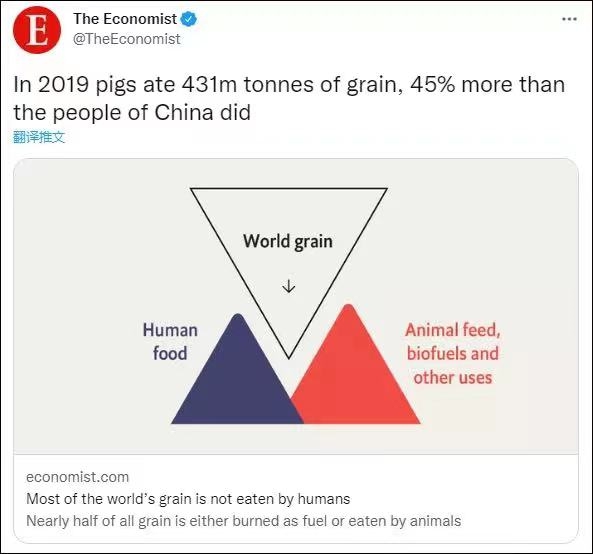
Screenshot of the now-deleted controversial tweet published by The Economist
UK publication The Economist on Wednesday deleted a tweet which compared pigs with Chinese people after it encountered a tidal wave of criticism for being racist and dehumanizing.
The now-deleted tweet was published on Tuesday and was used by The Economist to promote an article titled "Most of the world's grain is not eaten by humans."
"In 2019 pigs ate 432m tonnes of grain, 45% more than the people of China did," it read.
The sentence is a direct excerpt from the article, which, published on June 23, claims that despites the food crisis amid the Russia-Ukraine conflict, the world in fact is able to produce enough grain to meet humanity's needs. The problem is that 43 percent of the grain "is either burned as biofuel or used to feed animals," which is equal to six times the grain output of Ukraine and Russia combined.
Considering that fact, reducing waste and turning wheat and maize into bread instead of animal feed is probably the best remedy while governments are mulling policies to get a greater share of grains into grub, the article concluded.
Although the article mainly focuses on analyzing data of food consumption per country, area, and year, the inappropriate comparison between pigs and Chinese was widely criticized for being "awful," "racist" and "dehumanizing."
"Humans don't write like that," veteran Chinese journalist Liu Xin commented on Twitter.
Some pointed out that the comparison had allegedly violated Twitter's rules on speech, and "For Twitter to allow The Economist to make such incendiary statement is beyond the pale."
Some Chinese netizens showed their disappointment toward the magazine after the issue emerged on Chinese social media platforms. "I used to think The Economist was an authoritative magazine. It turns out it's not that good," a Chinese netizen commented.
The Global Times tried to contact The Economist but had not received reply as of time of press.
Global Times




